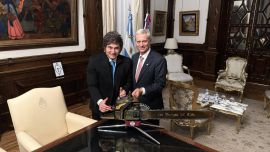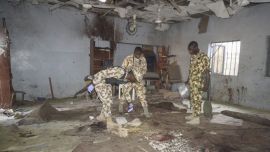The drug violence-plagued city of Rosario raced to the top of national agenda this week after a bloody killing spree launched by narcotics traffickers and drug-gangs.
On Thursday more than 450 members of the federal security forces arrived in the central city to be deployed across its most problematic areas – the latest in a flurry of measures taken by President Javier Milei’s government to regain control.
In addition, another 2,000 federal security officers – drawn from the ranks of the Coast Guard, Border Guard, Federal Police and Airport Security Force – are assisting security operations in Rosario.
Operations are focused on 10 neighbourhoods which are particularly prone to drug-related violence.
Officials are also planning to send an Italian-style “anti-mafia” bill to Congress to clamp down on organised criminal gangs.
Security Minister Patricia Bullrich issued a resolution Thursday creating a special “anti-mafia unit” to tackle drug violence and take on the gangs.
The decision to deploy federal police and troops comes after four people were killed last week in violence blamed on drug-trafficking gangs – two taxi-drivers, a bus-driver and a gas station employee.
The Santa Fe Province government says the gangs are hitting back after Governor Maximiliano Pullaro imposed harsher imprisonment conditions on high-profile inmates doing time for drug offences.
After the killing of the service station worker, attackers left a note in which they demanded “rights for prisoners in jail” and threatened to kill more innocent people.
Bloody ghost town
Parts of Rosario were turned into something of a ghost town on Monday after four drug-related murders scared residents and shut down activity.
No taxis were running, nor buses, while many schools were shut in Argentina’s third-largest city. Waste collection services were not running, petrol stations were closed and healthcare providers shut their doors.
School principals decided not to hold classes after the crimes that provoked “panic” in the population, which the government attributes to a “reaction” of imprisoned drug lords to the hardening of their conditions of detention.
Expressing their anger at the situation, residents staged pot-banging cacerolazo protests demanding greater security measures be taken.
Alejandro, a 48-year-old shopkeeper who did not want to give his surname for fear of reprisals, decided to open his business in Rosario along with a group of colleagues in the central Echesortu neighbourhood, although in other areas the shutters remained down for fear of an attack.
“Although we opened with fear and concern, the question was to feel free and not to give these people the pleasure of having everything closed,” he said.
“The economic aspect also plays a role, having the shop closed for one or two days means a lot of expenses in the midst of this economic crisis,” added Alejandro.
Normal life had resumed in the city by midweek but the security crisis continues.
Rosario has the worst homicide rate in the country: 22 per 100,000 inhabitants, five times the national average.
According to data from the Public Security Observatory of Santa Fe, 259 homicides have been registered in the last 12 months.
‘Narco terrorists’
Responding to the crisis, President Milei said last weekend his government would send federal security forces to the violence-plagued city.
Milei wrote on the social media platform X that he was acting in response to a request from Santa Fe Province Governor Maximiliano Pullaro, who has introduced a hard-line approach to drug gang members who are reportedly organising activities from jail.
The governor has also promised to finish construction of a long-delayed maximum security prison.
Meanwhile, the military will also provide support “always within the terms of the Internal Security Law,” Milei’s office added.
Argentina’s Armed Forces are banned by law from intervening on national soil but can provide support for “internal security operations,” especially through the use of their resources, such as trucks, vans and helicopters.
The president said his government is confronting “a group of narco terrorists desperate to hold on to power and impunity.”
“We are not going to stop pursuing them ... because we know it’s them or us,” Milei said.
Bullrich confirmed that an “anti-gang” law had been sent to Congress which “typifies a new modality of criminal prosecution, taking the crimes of these gangs and assigning them to all their members.”
On Thursday, the minister issued a new resolution creating an “anti-mafia unit” to combat drug violence. It will be made up of a “Special Anti-Mafia Investigation Group (GEIA) and a Mafia Action Organised Crime Evaluation Committee (MECOAM),” which will seek to strengthen crime prevention and improve investigation.
The objective is to “promote an integral and multi-agency approach in the fight against organised mafia crime,” the statement read.
Rosario is Argentina’s third-largest city, with a population of 1.3 million, and situated on the Paraná river. It has become a hotspot for the movement of drugs from Bolivia, Brazil, and Paraguay headed to Europe and Asia.
– TIMES with agencies






















Comments